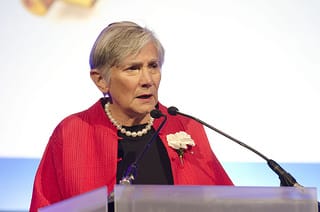 Diane Ravitch, the education-reform movement's "explosive turncoat." Photo by OHSchoolBoards on Flickr. |
Diane Ravitch, the education-reform movement’s explosive turncoat, has singled out Checker Finn’s recent dissent from for-profit school models for adulation with a blog entitled, “Checker Finn Opposes the For-Profit Model in Education.” We can quibble about whether Checker’s comment means he opposes the for-profit model (he is more than capable of defending himself on that score), but it is true that in Fordham’s recent report “Breaking Up Is Hard to Do: The Edison Story in Dayton,” Checker says, “Shareholder return ends up trumping the best interests of students…Most of the models I admire today are run by non-profit groups.”
I don’t find that quite so newsworthy as the fact that Ravitch extols the Fordham Institute, which she helped found, for “showing other advocacy groups what it means to be transparent and self-critical and honest.” That may be damning with faint praise, especially in the reformation-like context in which Diane has nailed her complaints to the church door, but it is worth pointing out that if Ms. Ravitch herself aimed to be self-critical and honest in the matter of “the best interest of students,” she would need to examine the public school model that she has, of late, been trumpeting. Here, honesty would require her to admit that there are many for-profit entities in public education whose interests trump the best interests of children; and teacher unions are the most powerful of the lot.
The analogy is thus: Teacher unions are to public education what shareholders are to for-profit education. One can plausibly argue that neither puts student interests before their own. As the famous quip attributed to Al Shanker has it, “When schoolchildren start paying union dues, that’s when I’ll start representing the interests of school children.” Even if Shanker didn’t say it, there is plenty of evidence—see Fordham’s new report on teacher unions—to suggest that unions are just as likely to put their own interests ahead of students’ as are shareholders.
I feel a bit like Rodney King here, but c’mon people. If we could begin to get that kind transparency and honesty from everyone in this debate, we might very well begin to seriously address the question of student interests—and actually start to improve our public school system.
